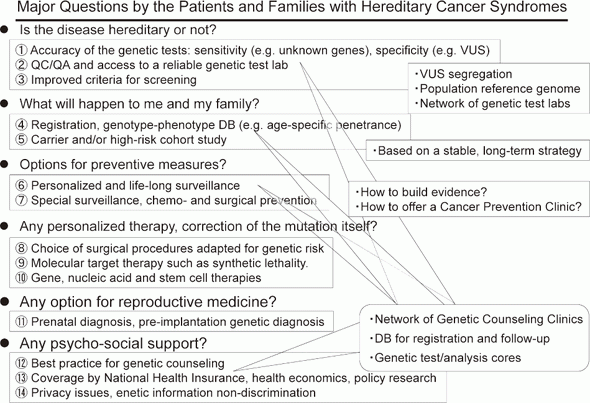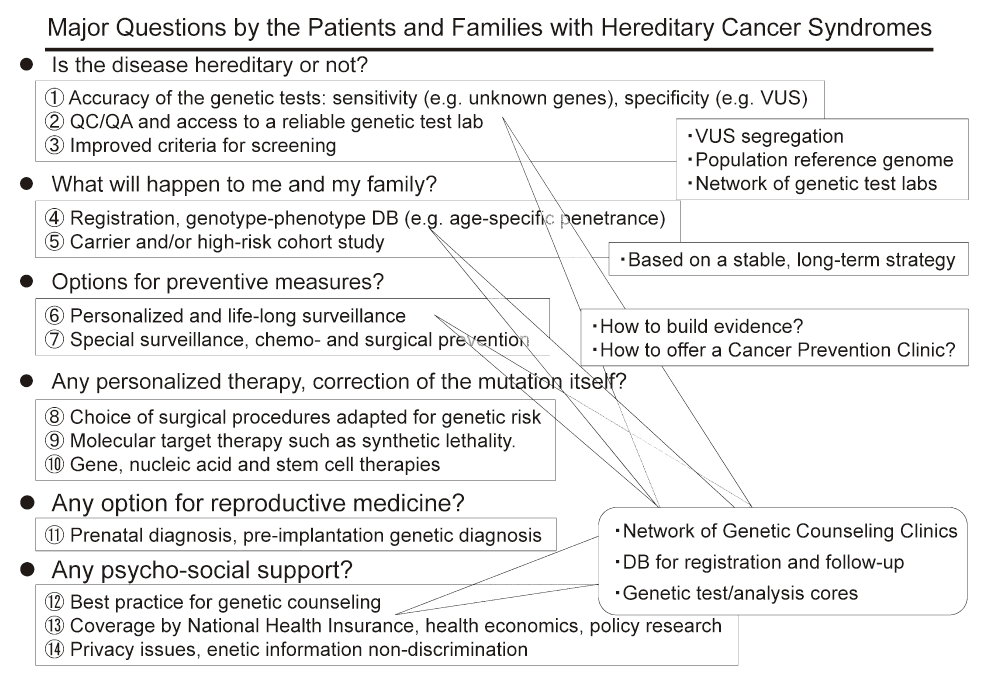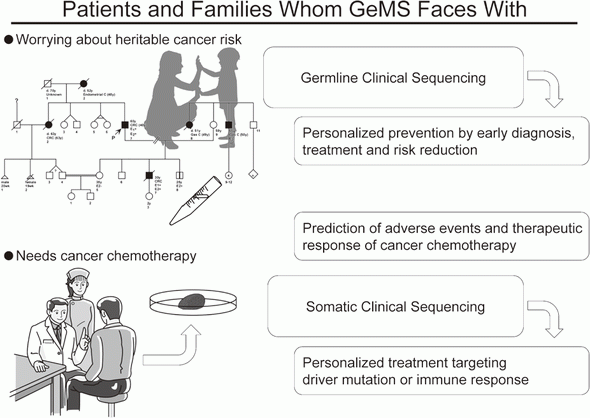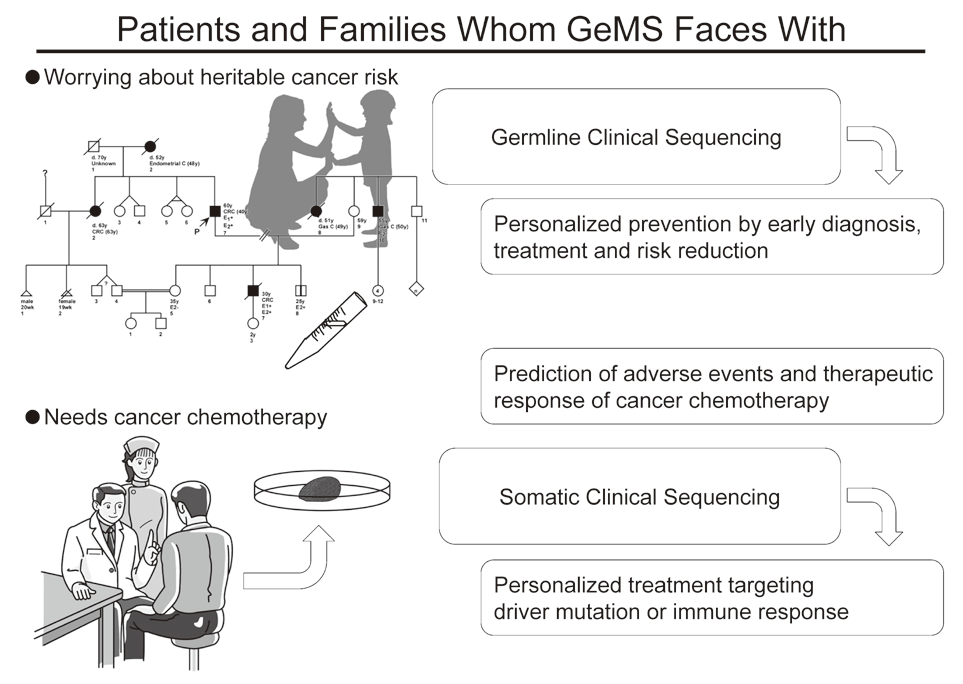HOME > Publication & Reports > Annual Report 2016 > Hospital
Department of Genetic Medicine and Services
Teruhiko Yoshida, Narikazu Boku, , Kokichi Sugano, Shigenobu Suzuki, Takayuki Kinoshita, Chikako Shimizu, Takeshi Nakajima, Mitsuya Ishikawa, Tadashi Kumamoto, Nobuyoshi Hiraoka, Shigeki Sekine, Taisuke Mori, Kuniko Sunami, Noboru Yamamoto, Takahisa Matsuda, Hiromi Sakamoto, Hitoshi Zembutsu, Mineko Ushiama, Takashi Kohno, Mamoru Kato, Hitoshi Ichikawa, Sadakatsu Ikeda, Noriko Tanabe
Introduction
It has been estimated that roughly 5% of all cancer cases are caused by a highly penetrant monogenic mutation. Major causative genes for most hereditary cancer syndromes were identified in the 1990s, and since then, genetic diagnosis has been considered as a part of standard medical care in oncology clinics. The National Cancer Center Hospital (NCCH) launched the Outpatient Genetic Counseling Clinic in 1998 as a part of collaboration with the NCC Research Institute, especially the Fundamental Innovative Oncology Core (FIOC). However, cancer medical genetics still has a number of issues to be addressed as shown in Figure 1.
Our team and what we do
The Department of Genetic Medicine and Services (GeMS) consists of 17 doctors, five researchers, and one genetic counselor. All of these staff hold the concurrent post of another department and research division, except the genetic counselor.
As shown on the NCCH web site, the aim and mission of the clinical service of the Outpatient Genetic Counseling Clinic, which are the major routine clinical activities of our department, are:
1)To provide consultation and appropriate medical and genetic information (that is, genetic counseling) to anyone who has a worry related to heredity cancer.
2)To provide genetic testing when appropriate.
3)To support early diagnosis and treatment based on family history and/or genetic test results.
In 2016, 370 clients and their relatives from 283 families visited the Clinic. Of these, 177 families and 248 clients newly visited this year. In total, 1,635 clients from 1,145 families have visited the clinic since its inception in 1998. Details are shown in Tables 1 and 2.
Research activities
Although at least one causative gene has been identified for each of the major hereditary cancer syndromes, overall sensitivity of the current genetic tests is far from 100% and may be around 70-80%, even for the cases that meet clinical and/or screening criteria for hereditary cancer syndromes. The false negative cases may include both inadequate technical sensitivity of the current genetic test methods on the established causative genes (allelic heterogeneity) and also yet-identified genes representing locus heterogeneity. There has been great expectation that the introduction of next generation sequencers (NGS) would change the situation. The staff of the Department of GeMS have established a new Common Protocol to perform NGS-based germline clinical sequencing for patients with negative test results by conventional genetic tests, who would represent a part of the Undiagnosed Disease Patients in the oncology field. The Common Protocol has been adopted by other hospitals and institutions in a long-standing multi-institute collaborative research group based on the National Cancer Center Research and Development Fund and its predecessor. In addition to whole exome sequencing (WES), a multi-gene panel has been developed based on Agilent SureSelect technology.
Clinical trials
The Outpatient Genetic Counseling Clinic has participated in a prospective clinical study to optimize BRCA1/2 genetic tests and a clinical trial of a PARP inhibitor for patients with ovarian or breast cancer, and both are directed by the Department of Breast and Medical Oncology and the Department of Breast Surgery.
Education
The Department of GeMS has accepted attendees for outpatient genetic counseling, so that they could be eligible to take the examination for clinical geneticists and certified genetic counselors acknowledged by the Japanese Society of Human Genetics and the Japanese Society of Genetic Counseling. In 2016, eight doctors were registered as trainees for clinical geneticists in the education committee of clinical geneticists.
Future prospects
The Department of GeMS was launched in November 2015. Although this section reports on the routine clinical activity of our department and clinical research associated directly with the Outpatient Genetic Counseling Clinic, the scope and mission of our department extends beyond hereditary cancer syndromes and includes support of the genomic biomarker-driven personalized cancer treatments offered by other clinical departments (Figure 2). The core technology of the new discipline, also known as a precision medicine, is next-generation sequencers, which would bring massive amounts of genomic data to cancer diagnosis, treatment, and prevention. The crux of this emerging opportunity is how to convert the sequence data to clinically valid and useful knowledge, which could include incidental or secondary findings. The Department of GeMS is expected to support other departments in the era of genomic medicine.
List of papers published in 2016
Journal
1.Shiraishi K, Okada Y, Takahashi A, Kamatani Y, Momozawa Y, Ashikawa K, Kunitoh H, Matsumoto S, Takano A, Shimizu K, Goto A, Tsuta K, Watanabe S, Ohe Y, Watanabe Y, Goto Y, Nokihara H, Furuta K, Yoshida A, Goto K, Hishida T, Tsuboi M, Tsuchihara K, Miyagi Y, Nakayama H, Yokose T, Tanaka K, Nagashima T, Ohtaki Y, Maeda D, Imai K, Minamiya Y, Sakamoto H, Saito A, Shimada Y, Sunami K, Saito M, Inazawa J, Nakamura Y, Yoshida T, Yokota J, Matsuda F, Matsuo K, Daigo Y, Kubo M, Kohno T. Association of variations in HLA class II and other loci with susceptibility to EGFR-mutated lung adenocarcinoma. Nat Commun, 7:12451, 2016
2.Sugano K, Nakajima T, Sekine S, Taniguchi H, Saito S, Takahashi M, Ushiama M, Sakamoto H, Yoshida T. Germline PMS2 mutation screened by mismatch repair protein immunohistochemistry of colorectal cancer in Japan. Cancer Sci, 107:1677-1686, 2016
3.Tanaka M, Nakajima T, Sugano K, Yoshida T, Taniguchi H, Kanemitsu Y, Nagino M, Sekine S. Mismatch repair deficiency in Lynch syndrome-associated colorectal adenomas is more prevalent in older patients. Histopathology, 69:322-328, 2016
4.Budhathoki S, Yamaji T, Iwasaki M, Sawada N, Shimazu T, Sasazuki S, Yoshida T, Tsugane S. Vitamin D Receptor Gene Polymorphism and the Risk of Colorectal Cancer: A Nested Case-Control Study. PLoS One, 11:e0164648, 2016
5.Inoki K, Nakajima T, Sekine S, Sugano K, Tsukamoto S, Yamada M, Mutoh M, Sakamoto T, Matsuda T, Sekiguchi M, Ushiama M, Yoshida T, Sakamoto H, Kanemitsu Y, Saito Y. Depressed-type submucosal invasive colorectal cancer in a patient with Lynch syndrome diagnosed using short-interval colonoscopy. Dig Endosc, 28:749-754, 2016
6.Tanakaya K, Yamaguchi T, Ishikawa H, Hinoi T, Furukawa Y, Hirata K, Saida Y, Shimokawa M, Arai M, Matsubara N, Tomita N, Tamura K, Sugano K, Ishioka C, Yoshida T, Ishida H, Watanabe T, Sugihara K. Causes of Cancer Death Among First-Degree Relatives in Japanese Families with Lynch Syndrome. Anticancer Res, 36:1985-1989, 2016
7.Uchino S, Ishikawa H, Miyauchi A, Hirokawa M, Noguchi S, Ushiama M, Yoshida T, Michikura M, Sugano K, Sakai T. Age- and Gender-Specific Risk of Thyroid Cancer in Patients With Familial Adenomatous Polyposis. J Clin Endocrinol Metab, 101:4611-4617, 2016
8.Kanemoto K, Fukuta K, Kawai N, Tozawa K, Ochiai M, Okamoto K, Ohnami S, Sakamoto H, Yoshida T, Kanai Y, Katoh M, Yasui T, Kohri K, Kakizoe T, Nakagama H. Genomic Landscape of Experimental Bladder Cancer in Rodents and Its Application to Human Bladder Cancer: Gene Amplification and Potential Overexpression of Cyp2a5/CYP2A6 Are Associated with the Invasive Phenotype. PLoS One, 11:e0167374, 2016








